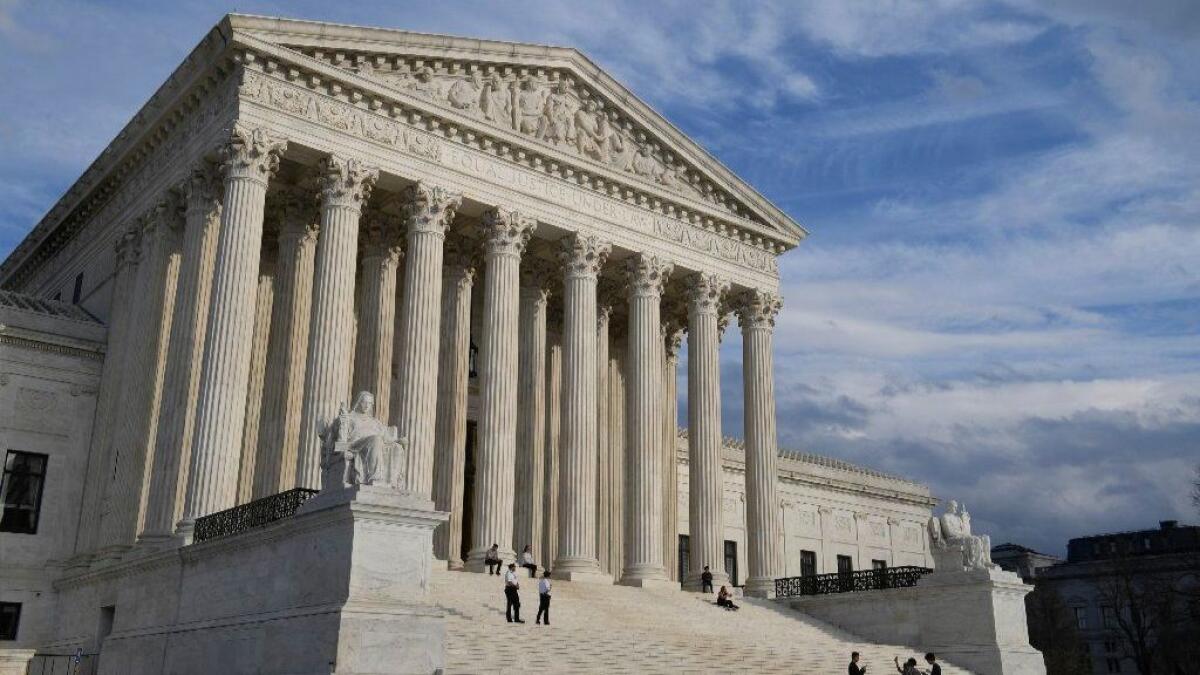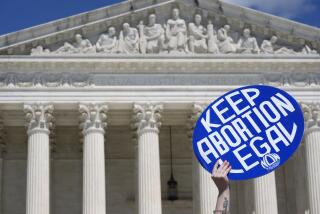Republicans see late-term abortion bills as a potent 2020 political issue

Reporting from Washington — Ahead of the 2020 election, Republicans in Washington and state capitals are homing in on one of the most emotionally charged parts of the abortion debate: those procedures conducted late in a pregnancy.
Opponents of abortion hope that their effort will mobilize conservatives and bolster Republican victories next year, potentially giving President Trump more opportunities to make Supreme Court appointments who would reverse or erode the landmark Roe vs. Wade decision.
On Capitol Hill, House Republicans have spent weeks trying to force a vote on an anti-abortion bill that would require medical professionals to provide care to a baby born during an attempted abortion. The measure, which carries a criminal penalty, is designed to highlight abortions conducted late in a pregnancy.
Abortion-rights groups call the bill a political stunt, saying current law already ensures that all babies born receive medical care and that babies are rarely born during an attempted abortion.
Anti-abortion advocacy groups are trying to make it politically difficult for moderate Democrats to vote against the measure. Family Research Council is running online ads on the issue in the congressional districts of seven moderate Democrats to highlight the lawmakers’ opposition to the GOP effort. Susan B. Anthony List, another political group that opposes abortion, plans to hold events and post online ads in the districts of moderate Democrats.
Conservative states are echoing the effort. On Tuesday, two state legislatures — Montana and North Carolina — passed similar versions of what they call “infanticide” bills. North Carolina Gov. Roy Cooper, a Democrat, vetoed the bill, calling it needless legislation that would criminalize healthcare workers “for a practice that simply does not exist.” Montana Gov. Steve Bullock, a Democrat, believes the bill is “more about politicizing women’s health than it is about public policy,” according to a spokesperson.
The state and federal efforts come ahead of the 2020 election, in which abortion — and future Supreme Court appointments — could be central to the debate. In 2016, then-candidate Trump won over anti-abortion groups when he criticized what he called Hillary Clinton’s support for “rip[ping] the baby out of the womb in the ninth month, on the final day.”
Critics called that a gross mischaracterization of Democrats’ opposition to putting restrictions on abortion late in pregnancy.
Abortions late in pregnancy are rare. Just over 1% of abortions are performed at 21 weeks or later, according to the Guttmacher Institute, a research group that supports abortion rights. An abortion after that time would likely occur because of a serious fetal anomaly or for the health of the woman. The vast majority of abortions — 89% — are done in the first 12 weeks of pregnancy.
The scenario of a baby born during an attempted abortion “really never happens,” said Dr. Daniel Grossman, a researcher and abortion provider at the UC San Francisco Bixby Center for Global Reproductive Health. “I’ve never been involved in a case where that happens,” he said.
The Centers for Disease Control and Prevention estimated that between 2003 and 2014, about 12 infants per year were born and later died for reasons related to an attempted abortion or terminated pregnancy.
Abortion opponents view the debate as a potent issue that will put Democrats in the uncomfortable position of voting against bills seemingly designed to protect babies.
“Most people in the country don’t support abortion on demand in the fifth month,” said Sen. Lindsey Graham (R-S.C.), who earlier this month held a Senate hearing on banning abortion after 20 weeks of pregnancy.
Anti-abortion advocates say they are merely responding to efforts by abortion-rights supporters to increase access to abortions later in pregnancy. They point to a recently passed New York state law, which permits abortion after 24 weeks in certain circumstances, such as fetal anomalies or to protect the health of the woman.
“To the extent the focus is there — and the pro-abortion side helped to put it there with the New York legislation and the statements coming out of Virginia — that’s helpful to open the eyes of others who may not have taken a clear look at the situation,” said David O’Steen, executive director of National Right to Life.
Democratic Virginia Gov. Ralph Northam also stirred controversy when he suggested in a radio interview that a baby born after an attempted abortion in the third trimester because of severe deformities or life-threatening problems would only be “kept comfortable,” but not necessarily be resuscitated or given life-saving emergency measures.
At campaign rallies — including one over the weekend — Trump has started to falsely accuse women and doctors who might find themselves in such rare circumstances of “executing” the baby.
Dr. Leana Wen, president of Planned Parenthood, calls it “manufactured outrage over something that is not happening” in order to refocus attention from Republican attempts at “outlawing all safe, legal abortions.”
In the House, Republicans plan to try to keep the issue front and center. GOP lawmakers have made more than two dozen attempts to pass their bill. Rep. Steve Scalise of Louisiana, the House minority whip, said Republicans will continue to try to force a vote on the bill, which Democrats have blocked.
“Any way we can bring attention to this is going to be real important,” he said.
The federal bill would require medical professionals to provide the same level of care to a baby born after an attempted abortion as they would to a baby born at the same gestational age.
When the bill came up for a vote in the Senate earlier this year, Sen. Patty Murray (D-Wash.) called it “another attack from our Republican colleagues on women’s health and their right to safe, legal abortion.”
“This bill is not about protecting infants as Republicans have claimed because that’s not up for debate and it is already the law,” she said.
In 2002, President George W. Bush signed a bill, widely approved by Republicans and Democrats, that made clear that it is illegal in every state to kill a child born at any stage of development. Advocates of the new bill say this effort goes further to ensure that healthcare workers take proactive steps to treat a child. But critics worry that the bill could impose criminal liabilities on a physician who doesn’t take steps to try to save a child even when his or her parents have decided that the best course of action is not to take extensive medical treatment.
Given the divided Congress, no federal legislation on abortion is expected to be approved in the next two years. But several conservative states have made it a priority to approve legislation restricting access.
In addition to the bills focusing on infants born after attempted abortion, four states — Kentucky, Mississippi, Ohio and Georgia — have approved bans on abortion as soon as a fetal heartbeat is detected, often at six weeks of pregnancy, sometimes before a woman knows she is pregnant. Three of the bills have been signed into law; the governor of Georgia has indicated he will also sign the bill.
Courts are likely to block the laws at least temporarily, as they have done with similar measures that passed previously in Iowa and North Dakota.
The bills are an effort to challenge the Supreme Court to revisit Roe’s determination that states cannot ban abortion before a fetus is viable outside the womb, usually about the 24th week.
While conservative states have taken up abortion prohibitions almost annually in recent years, this year’s crop marks a dramatic uptick, according to Elizabeth Nash, who tracks state abortion legislation at the Guttmacher Institute.
“We’ve had conservative legislatures adopting abortion restrictions at an unprecedented level for eight years. In a way, there is nothing left to do besides ban abortion,” Nash said, adding that the Supreme Court appointments of Justices Brett M. Kavanaugh and Neil M. Gorsuch are also motivating conservative lawmakers. “Put those two together and you have an environment where you see six-week abortion bans moving.”
The Supreme Court could take up an abortion case even sooner. The justices are now considering whether to hear a case out of Indiana, which tried to ban women from obtaining abortions because of a fetus’ race, gender or after the diagnosis of Down syndrome or another fetal anomaly. It was a bill signed into law in 2016 by then-Gov. Mike Pence. The Indiana appeal has been pending for months, a sign that the justices may be struggling over whether to accept it.
And other cases could be on the docket soon. On Wednesday, a Louisiana abortion clinic and the Center for Reproductive Rights asked the court to strike down a state law that prohibits physicians from performing abortions unless they have admitting privileges at a nearby hospital. It is similar to a Texas law that the court took up in 2016. Former Justice Anthony M. Kennedy sided with the court’s liberal justices to invalidate the requirement as overly burdensome with no health benefits.
More stories from Jennifer Haberkorn »
More to Read
Get the L.A. Times Politics newsletter
Deeply reported insights into legislation, politics and policy from Sacramento, Washington and beyond. In your inbox three times per week.
You may occasionally receive promotional content from the Los Angeles Times.











